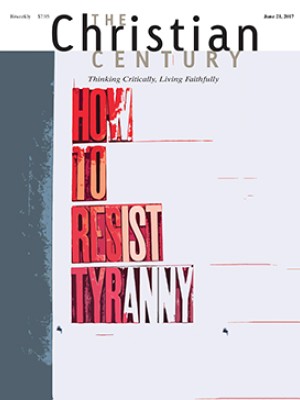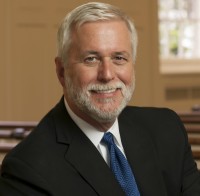The temporary gift of marriage
"I'm not afraid of marrying you," said the young groom. "I'm afraid of losing you."

It was supposed to be my last premarital counseling appointment with Sue and Mike. Like most pastors I’ve never enjoyed weddings that much, but I’ve always loved the conversations with couples who are about to enter into this covenant. Usually it’s only a matter of time before they reveal the most tender of anxieties.
I thought we had already worked through the biblical and theological perspectives on the apparent issues in Mike and Sue’s upcoming marriage. At this meeting we were just supposed to edit the wedding ceremony. We were sitting at the table in my study with copies of the proposed liturgy in front of us. As I was about to pass out the red ink pens, Mike said, “Before we get into this I have to say I’m really scared.”
Read our latest issue or browse back issues.
He now had Sue’s attention. As he saw her stunned look he quickly added, “Oh, I’m not afraid of marrying you. I’m terrified of losing you.” Then he looked back at me and explained, “Several years ago my mother died, and it almost killed me.” Turning again to Sue he continued, “What if something happens to you too? I can’t imagine how I would survive.”
He looked at me with big, puppy dog eyes. I knew he wanted me to say, “Oh Mike, don’t worry about that. You’re both young and there are so many wonderful years ahead for both of you.” But I’ve buried too many young people to say that.
So, as compassionately as possible, I said, “Mike, in my experience 100 percent of marriages come to an end, and you’ll never beat those odds.”
There was a pause before Mike stammered out, “What?” I tried again. “Well, your marriage will end in either death or divorce. There are no alternatives.” This time his face was blank.
I sat back in my chair. “Let’s say you have a fabulous marriage that lasts as long as we can imagine. How about 60 years? Or 70? There are few of those, but let’s assume you have 70 years, and that each of those years is an experience in deeper intimacy. Still, one of you is eventually going to have to lay the other into the arms of God. That day will tear you apart.”
Young people often assume that the funerals for old lovers are not so difficult, as if the weeping person in the first pew is thinking, “Well, we had a good run.” To the contrary, the better the marriage the harder it is at the end. A great marriage concludes with two souls that have become so intertwined the survivor has no idea what survive means without the one in a grave.
So I looked at Mike and continued, “That’s the best possible scenario for your marriage—to share a love so incredible and so long with Sue that it almost kills you to give her up at the end.” He was not encouraged.
“So why do you want to go through all of that?” I asked. “I say give her up today. Give her back to the Creator who made her, sustains her, and to whom she will always belong. Get the grieving over with before it becomes unbearable. Let God hold her. That way, every morning when you find her next to you, you can rejoice in the temporary gift you can still enjoy.”
It has been about 20 years since I officiated at Sue and Mike’s wedding. I lost track of them after we both made a couple of moves. But I’ve often told this story when giving sermons about living with open hands. Recently I used the illustration at a church where a friend of Mike and Sue attends. I was surprised to receive an email shortly afterward indicating he knew whom I was talking about. And I was devastated to read that Mike died last November of a heart attack at the age of 50. So it was Sue who was left behind. Way too soon.
After finding Sue’s email address I contacted her to offer my condolences. Her response included a photograph of Mike wearing a “Best Dad Ever” T-shirt, surrounded by their two kids on Father’s Day. It made me tear up. But I knew that Sue was going to be OK when I read, “His death is inexplicable in any logical sense, but I very much feel this is part of the mystery of life. In the six months that have passed, I can say I revere this mystery. I don’t want or need to understand everything about our lives on this earth.”
She concluded with “I would think one of the pleasures of marrying young couples who are deeply in love is to see the product of that love decades later.” She’s certainly right about that. When I read such words about revering mystery from a new widow, I’m pleased to know that she understands what can never be understood. It’s the only way she can carry on without Mike.
A version of this article appears in the June 21 print edition under the title “The temporary gift of marriage”







